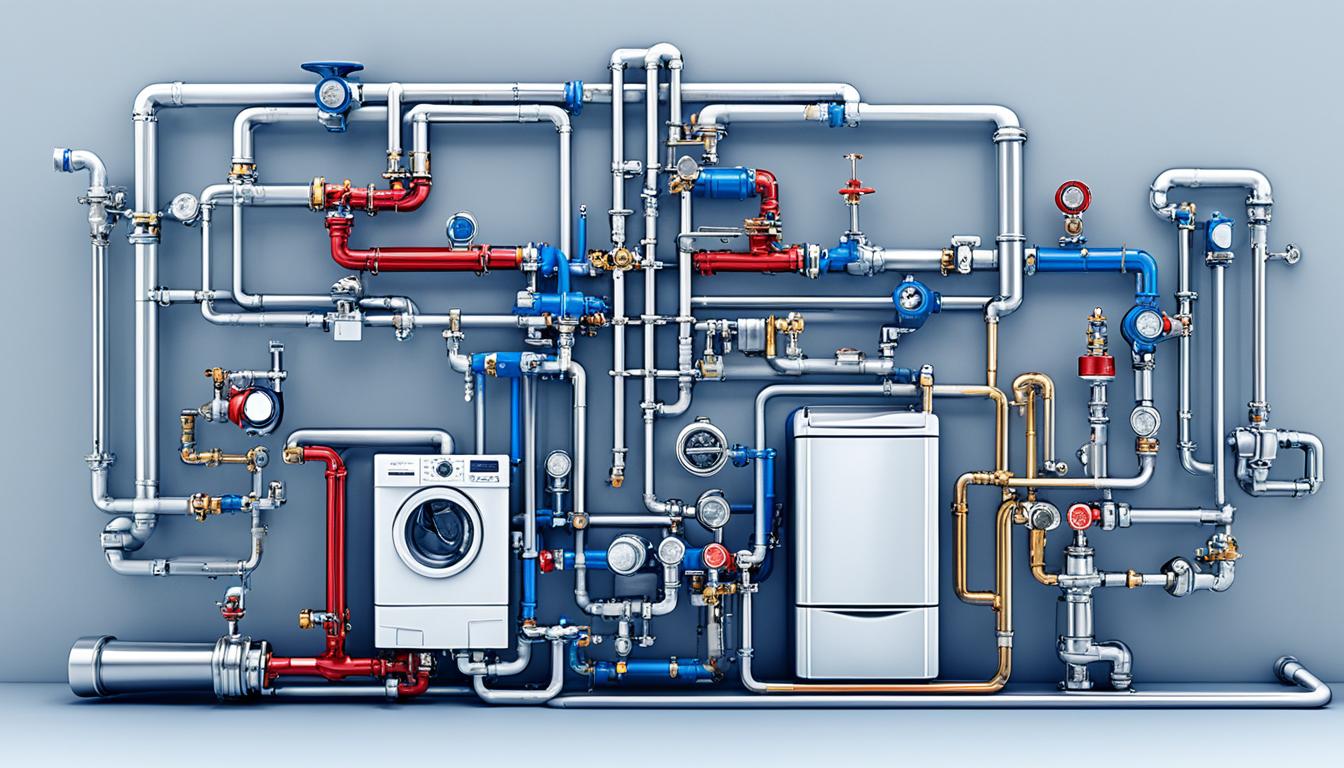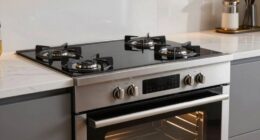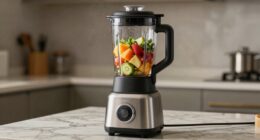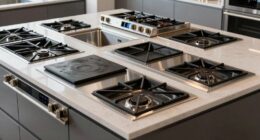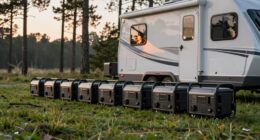Have you ever thought about which small appliances use up the most electricity? As energy consumption experts, we have reviewed and put together a list of the main offenders.
Coffee makers, space heaters, electric stoves, clothes dryers, dishwashers, air conditioners, and electric kettles are just a few of the power-hungry contenders.
In this article, we will delve into the specifics, providing you with technical insights and precise data that will empower you to make informed decisions about your energy usage.
Key Takeaways
- Coffee makers, especially espresso machines and single-serve pod-based machines, consume a significant amount of electricity.
- Space heaters, particularly those with higher wattage, can consume a substantial amount of electricity and result in higher monthly costs.
- Electric stoves consume a significant amount of electricity, while gas stoves are more energy-efficient.
- Clothes dryers and dishwashers are other small appliances that consume a significant amount of electricity. Opting for energy-efficient models and using lower heat settings can help reduce energy usage.
Coffee Makers
Coffee makers can consume a significant amount of electricity, with some models using up to 1200 watts.

When considering energy efficiency, it’s important to understand the different brewing methods employed by coffee makers.
There are three main brewing methods: drip, espresso, and single-serve.
Drip coffee makers, the most common type, heat water and then slowly drip it over coffee grounds. This method is relatively energy-efficient, as it requires less power compared to espresso machines.
Espresso machines, on the other hand, use high pressure to force water through finely ground coffee, resulting in a concentrated and flavorful cup of coffee. However, due to the need for heating elements and pumps, espresso machines consume more electricity.

Single-serve coffee makers, like pod-based machines, offer convenience but are often less energy-efficient than drip coffee makers, as they require additional energy to heat water on demand.
Space Heaters
One small appliance that can consume a significant amount of electricity is a space heater. Space heaters are commonly used for heating small areas, such as individual rooms or offices. However, it is important to be aware of their energy usage and safety considerations.
To illustrate the energy consumption of space heaters, consider the table below which compares the wattage and estimated monthly cost of operating different types of space heaters:
| Space Heater Type | Wattage | Estimated Monthly Cost |
|---|---|---|
| Electric | 1,500W | $45 |
| Infrared | 750W | $22.50 |
| Ceramic | 1,500W | $45 |
It is evident that space heaters with higher wattage tend to consume more electricity, resulting in higher monthly costs. Additionally, it is essential to follow space heater safety guidelines to prevent accidents and ensure the well-being of occupants.

With the understanding of space heater energy usage and safety considerations, we now move on to discussing another small appliance that consumes significant electricity: electric stoves.
Electric Stoves
Electric stoves are a common small appliance that consumes a significant amount of electricity. When it comes to electric stove safety, it’s important to be cautious of potential hazards. Always ensure that the stove is installed properly and use it in accordance with the manufacturer’s instructions. Regularly inspect the stove for any signs of wear or damage, and promptly address any issues. Additionally, it’s crucial to keep flammable materials away from the stove and never leave it unattended while cooking.
In terms of electric stoves versus gas stoves, there are a few key differences to consider. Electric stoves offer precise temperature control and heat distribution, making them ideal for tasks that require consistent heating, such as baking. They’re also generally easier to clean and maintain.
On the other hand, gas stoves provide instant heat and are more energy-efficient. However, they require a gas connection and can present safety concerns if not properly used or maintained. Ultimately, the choice between an electric stove and a gas stove depends on individual preferences and needs.
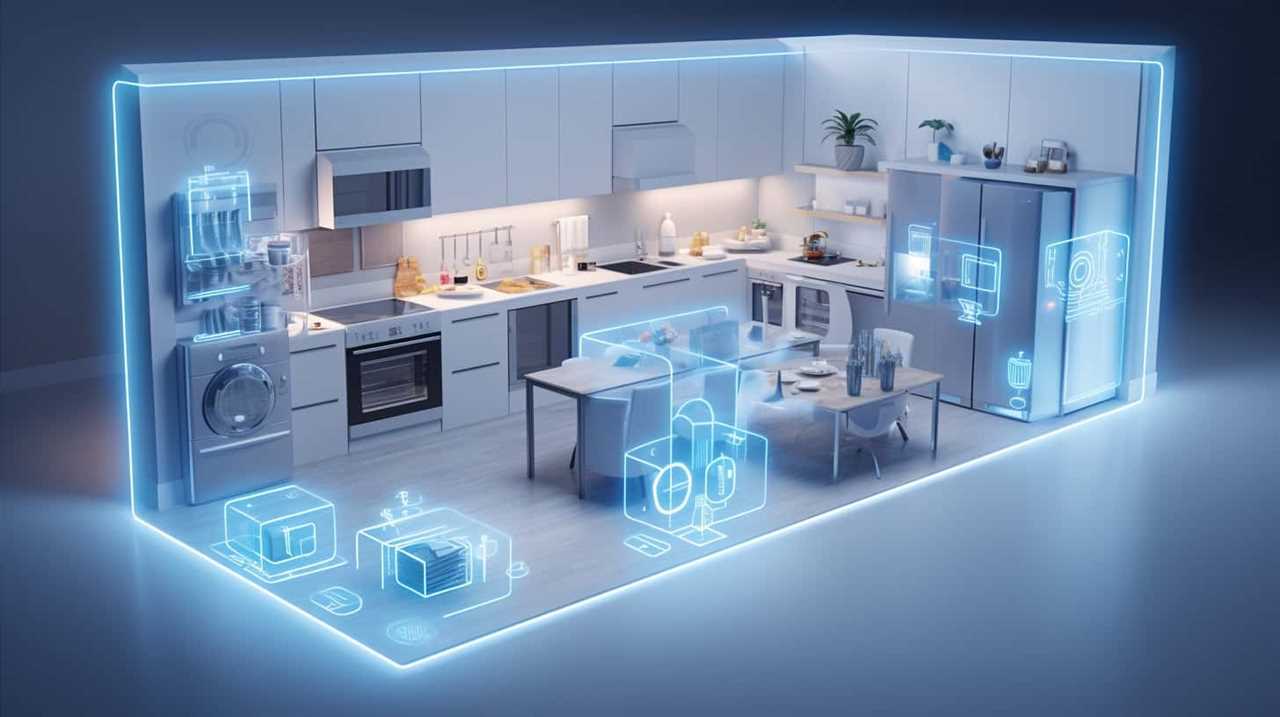
Clothes Dryers
After discussing electric stoves, let’s now turn our attention to clothes dryers, which are another small appliance that consumes a significant amount of electricity. When it comes to energy usage, clothes dryers rank high on the list. Here are three key points to consider:
- Energy-Efficient Models: Investing in an energy-efficient clothes dryer can help reduce electricity consumption. Look for models that have the Energy Star label, as they meet strict efficiency guidelines.
- Drying Cycles: Opting for shorter drying cycles and using lower heat settings can significantly reduce energy usage. Consider using moisture sensors that automatically shut off the dryer when the clothes are dry.
- Environmental Impact: Clothes dryers contribute to carbon emissions, as electricity production often relies on fossil fuels. Reducing energy usage not only lowers utility bills but also helps reduce the environmental impact.
Now, let’s move on to our next subtopic: dishwashers.
Dishwashers
Moving on from clothes dryers, let’s now focus our attention on dishwashers, another small appliance that consumes a significant amount of electricity.
Dishwashers are designed to efficiently clean and sanitize dishes, utensils, and cookware. They’re equipped with heating elements, pumps, and spray arms to ensure thorough cleaning.

The energy usage of a dishwasher depends on several factors, including the size of the dishwasher, the water temperature, and the cycle selected. On average, a dishwasher can consume around 1,200 to 2,400 watts per cycle. This energy consumption is comparable to that of coffee makers, which typically use around 800 to 1,500 watts when brewing.
To minimize electricity usage, consider using energy-saving modes, running full loads, and avoiding pre-rinsing dishes.
Air Conditioners
When it comes to air conditioners, it’s important to consider their energy consumption, efficiency ratings, and costs.
By comparing the energy consumption of different models, we can determine which ones use the most electricity.

Efficiency ratings provide insight into how well an air conditioner converts energy into cooling power.
Energy Consumption Comparison
Air conditioners consume a significant amount of energy. When comparing the energy consumption of air conditioners, there are a few factors to consider. Here are three key points to keep in mind:
- Energy-saving tips: Opt for energy-efficient air conditioners with a high SEER (Seasonal Energy Efficiency Ratio) rating. Properly insulate your home to reduce energy loss. Use programmable thermostats to regulate temperature and reduce unnecessary cooling.
- Standby power: Air conditioners can consume energy even when not in use. Ensure that your air conditioner is fully turned off when not needed, and unplug it to prevent standby power consumption.
- Size and capacity: Choosing the right-sized air conditioner for your space is crucial. An oversized unit will waste energy, while an undersized unit will struggle to cool effectively. Consult with a professional to determine the appropriate size and capacity for your needs.
Efficiency Ratings and Costs
To understand the efficiency ratings and costs of air conditioners, we need to consider a few important factors. Efficiency benefits and cost-saving options play a crucial role in determining the overall performance and value of an air conditioning unit. When it comes to efficiency ratings, the Seasonal Energy Efficiency Ratio (SEER) is the most commonly used metric. A higher SEER rating indicates a more energy-efficient unit, which can lead to significant cost savings over time. Additionally, opting for energy-saving features such as programmable thermostats and variable-speed compressors can further enhance the efficiency of the air conditioner. By investing in an energy-efficient unit and making smart choices, consumers can enjoy the benefits of lower electricity bills and reduced environmental impact.
| Factor | Description | Benefits |
|---|---|---|
| SEER Rating | Measures cooling efficiency | Higher SEER rating = Lower energy consumption and costs |
| Energy-Saving Features | Programmable thermostats, variable-speed compressors | Enhances efficiency, reduces energy waste |
| Smart Choices | Proper sizing, regular maintenance | Optimizes performance, prolongs lifespan |
Electric Kettles
When it comes to electric kettles, there are energy-efficient alternatives available that can help save electricity.
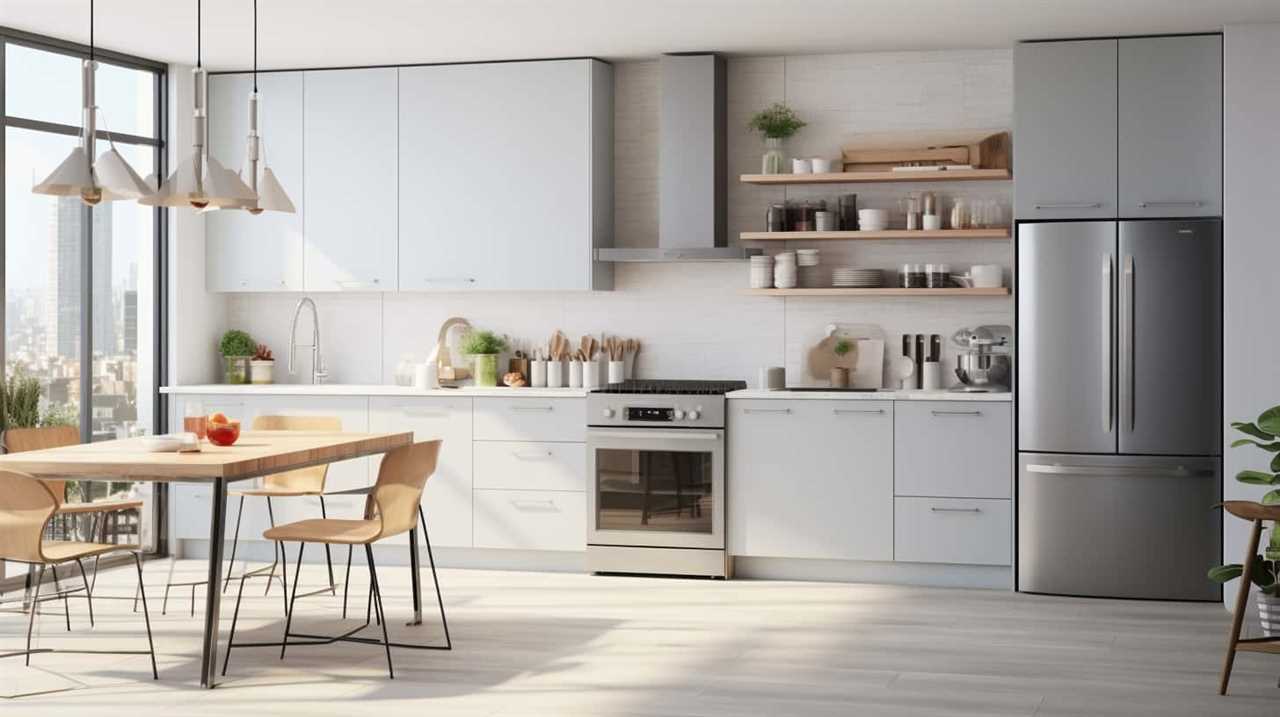
It’s important to compare the energy consumption of electric kettles with traditional stovetop kettles to determine which option is more efficient.
Energy-Efficient Alternatives Available
After researching the energy consumption of small appliances, we discovered a viable alternative to traditional electric kettles. By investing in an energy-efficient electric kettle, you can reduce your electricity usage and save on energy costs.
Here are three energy-saving tips when considering an alternative to traditional electric kettles:
- Look for kettles with insulation features to retain heat and minimize energy loss.
- Opt for kettles with variable temperature settings, allowing you to heat water to the desired temperature, thus avoiding unnecessary energy usage.
- Consider kettles with automatic shut-off features that turn off the heating element once the water reaches boiling point.
These energy-efficient alternatives not only reduce electricity usage but also provide convenience and precision in heating water.
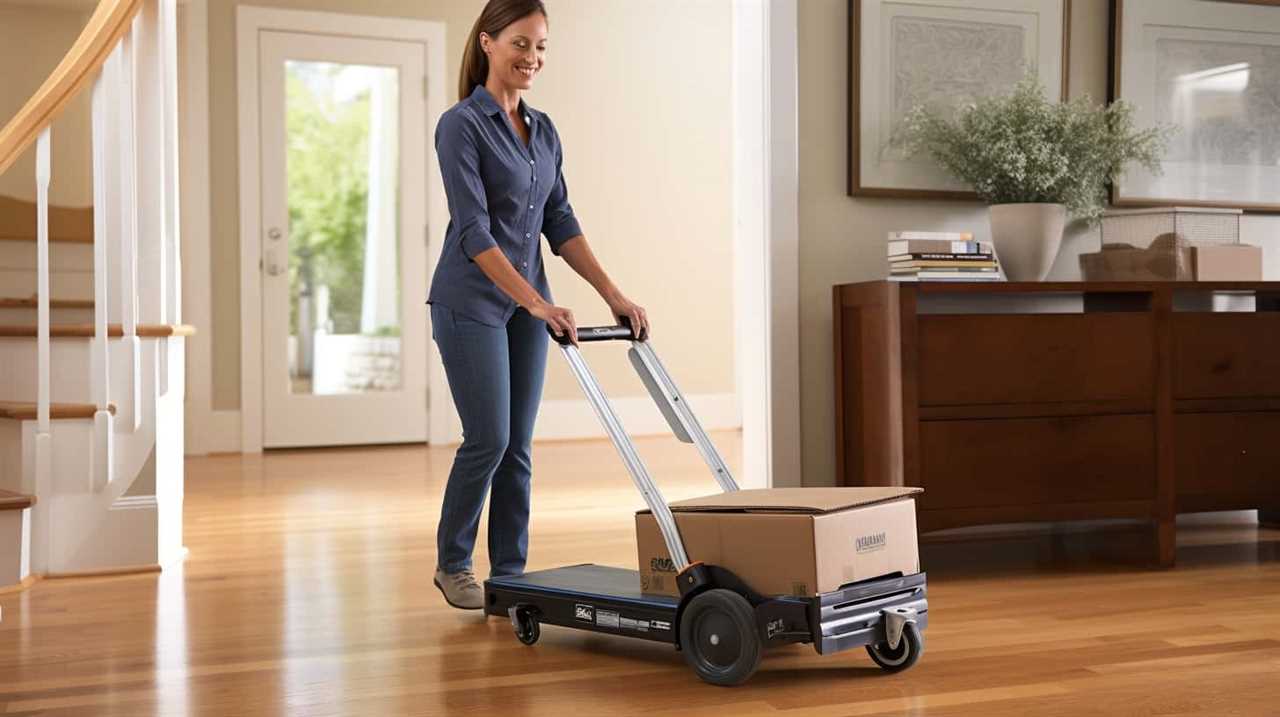
Now, let’s delve into the kettle vs stovetop comparison to further understand the benefits of energy-efficient electric kettles.
Kettle Vs Stovetop Comparison
Now let’s compare energy-efficient electric kettles to stovetop kettles to determine which option is more efficient and cost-effective. When it comes to kettle efficiency, electric kettles have the upper hand. They are designed to heat water quickly and efficiently, using less energy compared to stovetop kettles. Electric kettles also have the advantage of automatic shut-off features, preventing overheating and energy waste. On the other hand, stovetop kettles rely on direct heat from a stove burner, which can be less efficient and take longer to heat up. However, it’s important to consider stovetop safety. Electric kettles eliminate the risk of an open flame, making them a safer option, especially in households with children or pets.
| Electric Kettles | Stovetop Kettles | |
|---|---|---|
| Efficiency | High | Lower |
| Speed | Fast | Slower |
| Safety | Safer (no open flame) | Risk of open flame |
| Energy Usage | Less | More |
| Cost-effectiveness | More cost-effective in the long run | Can be cheaper upfront |
Toaster Ovens
Toaster ovens consume a significant amount of electricity compared to other small appliances. When using a toaster oven, it’s important to prioritize safety. Here are some toaster oven safety tips to keep in mind:
- Always unplug the toaster oven when not in use to prevent any accidental electrical shocks.
- Avoid placing any flammable materials near the toaster oven to reduce the risk of fire.
- Use oven mitts or heat-resistant gloves when handling hot trays or removing food from the toaster oven to prevent burns.
In addition to safety precautions, here are some toaster oven cooking tips to enhance your mastery of this appliance:

- Preheat the toaster oven before cooking to ensure even and consistent cooking.
- Adjust the cooking time to account for the smaller size of the toaster oven compared to a regular oven.
- Consider using the broil setting for quick browning or crisping of food.
Frequently Asked Questions
Can I Leave My Coffee Maker Plugged in Overnight?
We usually leave our coffee maker plugged in overnight for convenience, but it’s not the most energy-efficient approach. Coffee maker maintenance is important, and using a timer can help save electricity.
How Much Electricity Does a Space Heater Use on Average?
On average, a space heater consumes a significant amount of electricity. Its wattage varies, but running it can be costly. We must be mindful of energy usage to ensure efficiency and avoid excessive expenses.
Are Electric Stoves More Energy-Efficient Than Gas Stoves?
Electric stoves require regular maintenance to ensure optimal performance. When comparing costs, gas stoves may be more energy-efficient, resulting in lower utility bills. However, electric stoves offer greater precision and control in cooking, making them popular among those seeking culinary mastery.
How Long Does It Take for a Clothes Dryer to Dry a Full Load of Laundry?
When considering clothes dryer efficiency, it is important to analyze the laundry drying time. Factors like load size, fabric type, and dryer settings can impact how long it takes to dry a full load of laundry.

Is It More Cost-Effective to Wash Dishes by Hand or Use a Dishwasher?
When considering the cost comparison between washing dishes by hand or using a dishwasher, one must also analyze water usage. This analysis will provide a comprehensive understanding of the most cost-effective method for cleaning dishes.
Conclusion
In conclusion, when it comes to small appliances that consume the most electricity, coffee makers and space heaters take the lead.
Surprisingly, a single cup of coffee brewed daily for a year can use as much electricity as running a refrigerator for a month. This statistic emphasizes the importance of being mindful of our energy consumption and making conscious choices to reduce our environmental impact.

